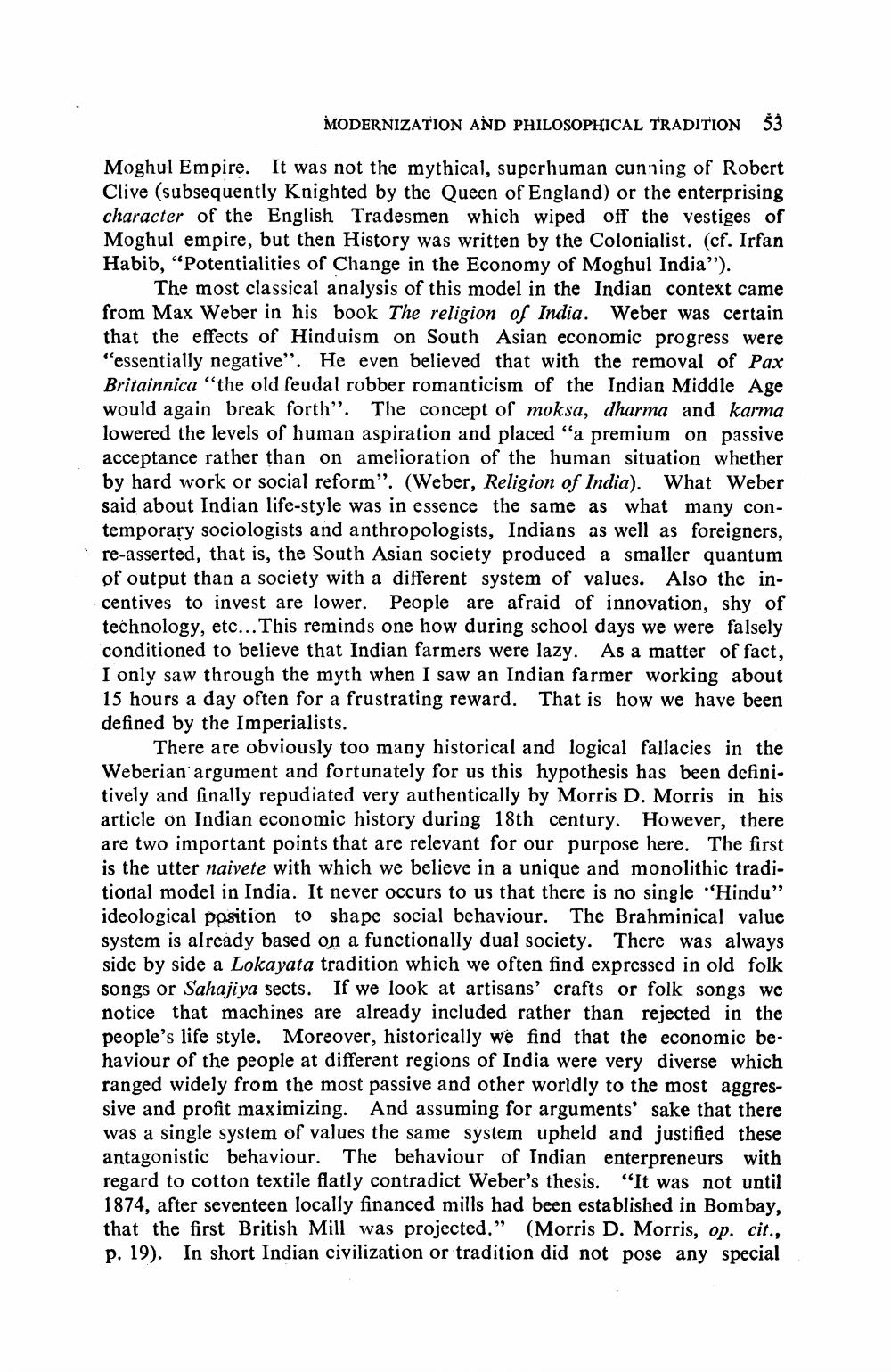Book Title: Modernization And Philosophical Tradition India And Third World Author(s): Sachindranath Ganguly Publisher: Sachindranath Ganguly View full book textPage 7
________________ MODERNIZATION AND PHILOSOPHICAL TRADITION 53 Moghul Empire. It was not the mythical, superhuman cunning of Robert Clive (subsequently Knighted by the Queen of England) or the enterprising character of the English Tradesmen which wiped off the vestiges of Moghul empire, but then History was written by the Colonialist. (cf. Irfan Habib, "Potentialities of Change in the Economy of Moghul India''). The most classical analysis of this model in the Indian context came from Max Weber in his book The religion of India. Weber was certain that the effects of Hinduism on South Asian economic progress were "essentially negative". He even believed that with the removal of Pax Britainnica "the old feudal robber romanticism of the Indian Middle Age would again break forth”. The concept of moksa, dharma and karma lowered the levels of human aspiration and placed "a premium on passive acceptance rather than on amelioration of the human situation whether by hard work or social reform". (Weber, Religion of India). What Weber said about Indian life-style was in essence the same as what many contemporary sociologists and anthropologists, Indians as well as foreigners, re-asserted, that is, the South Asian society produced a smaller quantum of output than a society with a different system of values. Also the incentives to invest are lower. People are afraid of innovation, shy of technology, etc... This reminds one how during school days we were falsely conditioned to believe that Indian farmers were lazy. As a matter of fact, I only saw through the myth when I saw an Indian farmer working about 15 hours a day often for a frustrating reward. That is how we have been defined by the Imperialists. There are obviously too many historical and logical fallacies in the Weberian argument and fortunately for us this hypothesis has been definitively and finally repudiated very authentically by Morris D. Morris in his article on Indian economic history during 18th century. However, there are two important points that are relevant for our purpose here. The first is the utter naivete with which we believe in a unique and monolithic traditional model in India. It never occurs to us that there is no single "Hindu" ideological position to shape social behaviour. The Brahminical value system is already based on a functionally dual society. There was always side by side a Lokayata tradition which we often find expressed in old folk songs or Sahajiya sects. If we look at artisans' crafts or folk songs we notice that machines are already included rather than rejected in the people's life style. Moreover, historically we find that the economic be. haviour of the people at different regions of India were very diverse which ranged widely from the most passive and other worldly to the most aggressive and profit maximizing. And assuming for arguments' sake that there was a single system of values the same system upheld and justified these antagonistic behaviour. The behaviour of Indian enterpreneurs with regard to cotton textile flatly contradict Weber's thesis. "It was not until 1874, after seventeen locally financed mills had been established in Bombay, that the first British Mill was projected.” (Morris D. Morris, op. cit., p. 19). In short Indian civilization or tradition did not pose any specialPage Navigation
1 ... 5 6 7 8 9 10 11 12 13 14
